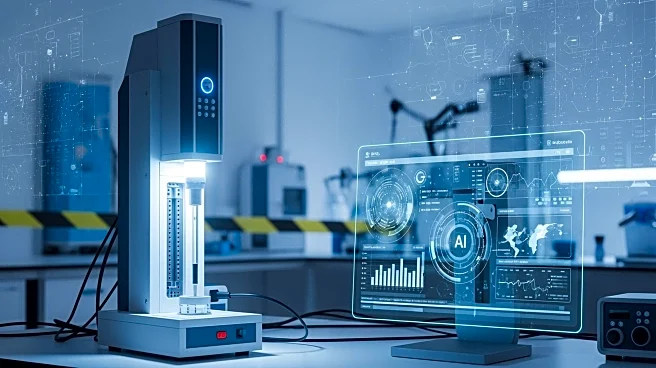What's Happening?
A research team led by Ju Li at the Massachusetts Institute of Technology (MIT) has published a significant study in the journal Nature, detailing the development of a multimodal robotic platform named
CRESt (Copilot for Real-world Experimental Scientists). This platform integrates material design with high-throughput automated experiments, significantly enhancing the speed and quality of catalyst research and development. The CRESt system utilizes Knowledge-Assisted Bayesian Optimization (KABO) to efficiently navigate the vast chemical design space, completing over 3,500 electrochemical tests in just 90 days. The platform's innovations include the use of Vision-Language Models (VLMs) to diagnose and correct experimental anomalies, thereby improving reproducibility and reducing manual intervention.
Why It's Important?
The development of the CRESt platform represents a major advancement in the field of materials science, particularly in the optimization of catalysts. By automating and integrating various data sources, the platform accelerates the discovery process, potentially leading to more efficient and cost-effective catalysts. This has significant implications for industries reliant on chemical processes, such as energy and manufacturing, as it could lead to the development of more sustainable and efficient technologies. The ability to rapidly test and optimize chemical compositions could also spur innovation in other scientific fields, enhancing the U.S.'s competitive edge in global scientific research and development.
What's Next?
The success of the CRESt platform may lead to its adoption in other areas of scientific research, where similar challenges in data integration and experimental reproducibility exist. As the platform continues to evolve, it could facilitate further breakthroughs in materials science and beyond. Researchers and industries may explore collaborations to apply this technology to other complex scientific problems, potentially leading to new discoveries and innovations. The ongoing refinement of the platform's algorithms and diagnostic capabilities will likely enhance its utility and effectiveness in various research contexts.
Beyond the Headlines
The CRESt platform's integration of artificial intelligence and robotics into scientific research highlights a broader trend towards automation and data-driven decision-making in science. This shift could lead to ethical and practical considerations regarding the role of human scientists in research and the potential for AI to replace certain aspects of experimental work. Additionally, the platform's ability to diagnose and correct experimental errors could set new standards for reproducibility and reliability in scientific research, addressing long-standing challenges in the field.










